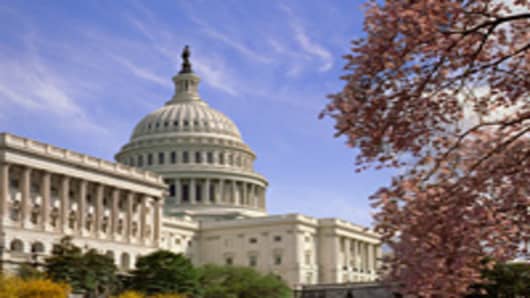Politicians on Capitol Hill are playing with fire on the debt ceiling and need to accept responsibility for the debt crisis rather than engaging in a hypocritical debate on tax and spending, according to Jan Poser, the chief economist at Sarasin in Zurich.
“A US sovereign default is definitely the worst outcome imaginable for financial markets” said Poser in a research note.
“A US interest rate hike would put companies and consumers under pressure and trigger a global recession. Global banks, whose financing requirements depend on the ‘risk-free’ government bonds held on their balance sheets, would immediately become insolvent,” he added.
Claiming such an outcome is inconceivable, Poser questions why the policy makers are squabbling when the danger of doing so is so high.
“Despite the fact that politicians are playing with a national bankruptcy, the administration would not stop servicing the nation’s debt in the event of an acute shortage of funds, but would instead defer running costs,” said Poser.
“This is not an implausible scenario. As a result of a conflict between Democratic President Clinton and the Republican-controlled Congress over public spending, a so-called Federal government shutdown occurred between November 1995 and January 1996,” he said.
With the Republicans backing last autumn’s fiscal package which extended tax cuts, Poser believes they should allow the debt ceiling to be raised or risk losing political credibility. The Republicans' longer term plans, though, are to be applauded, in Poser’s view.
“Aside from boosting the size of its Tea Party movement, the opposition is pursuing a wholly laudable goal amid all this commotion: the debate over consolidating public finances,” he wrote.
“We do not wish to be alarmist because the USA has sufficient means—both internally and externally—to finance its mounting level of debt for decades. Nonetheless, this does not alter the fact that US debt dynamics are on a collision course with the country’s AAA credit rating,” said Poser.
Without a change in current fiscal policies, Poser predicts America’s debts and interest payments will eventually swamp the country and trigger a sovereign default.
“However, the US would have forfeited its top credit rating and a devastating bond crash would have occurred long before this happens,” he wrote.
The US needs to save $240 billion each year. Since Congress works on the basis of a 10-year plan, it would need to agree a package of spending cuts and revenue increases that would net a total of $2.4 trillion, he said.
“But at the same time, the debt ceiling would have to be raised to $19.8 trillion to put the issue of the debt ceiling to rest until 2016,” Poser added.
“We expect Congress will at least negotiate an austerity package. But due to the myopia of politicians, the debt ceiling will probably not even be lifted by the $2 trillion needed to delete it from the election agenda in 2012,” he wrote.



